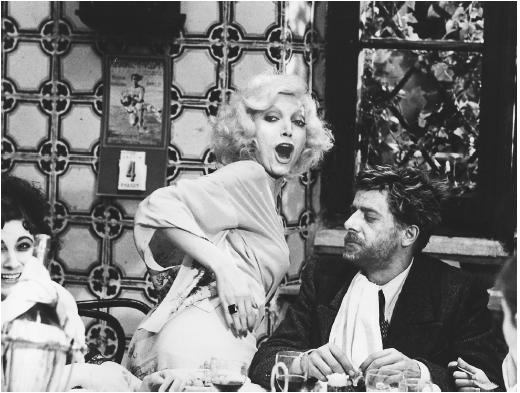Film d'amore e d'anarchia is Lina Wertmüller's fourth feature and the first work to bring her critical attention in the United States. The film reveals the influence of Federico Fellini for whom Wertmüller worked as an assistant director on 8½ , and it incorporates most of the elements that were to become trademarks of the Wertmüller canon. From Fellini she inherited a tendency towards comic exaggeration, both in creating types and in producing broad performances. Typical to her own concerns are the thematic interest in sexual politics, frequently set against a political backdrop; commanding heroines, and flawed, vulnerable heroes.
D'amore e d'anarchia is framed by two scenes: the first depicts the childhood trauma of the peasant Tunin (Giancarlo Giannini). When Tunin's father, a rural anarchist, is shot by the police, the young boy assumes his father's mission to assassinate Mussolini.
 |
| Film d'amore e d'anarchia |
The second framing scene is his death in a Roman prison some decades later. The remainder of the film takes place in a Roman bordello where the adult Tunin meets Salomé (Mariangela Melato), an anarchist sympathizer, and Tripolino (Lina Polito), a young prostitute. As protector and lover, Salomé provides Tunin with information that she extracts from a self-important client, Spatoletti, the head of Mussolini's secret police. Yet, gradually, Tunin falls in love with Tripolino. The climax of the film takes place on the day appointed for Mussolini's assassination. Tripolino hides the key to Tunin's bedroom; she hopes that by allowing him to oversleep, she will prevent both the deed and the punishment. She and Salomé fight over the "key" to Tunin's fate: a struggle between love and anarchy. Finally Tripolino succeeds in convincing Salomé that she should opt for personal happiness. But that is not to be; once Tunin discovers their collusion, he goes berserk, shooting widely at some policemen who have come to check the prostitute for venereal disease. The film ends with Tunin's execution, as the police repeatedly strike Tunin's head against the stone walls of his cell.
D'amore e d'anarchia is part of that outpouring of Italian films, released between 1969 and 1972, that examines the relations of individuals and institutions of authority, particularly during the Fascist period. Included in this group are Bertolucci's Il conformista and Strategia del ragno , Bellocchio's Nel nome del padre , and Visconti's La caduta degli dei . In contrast to her compatriots or the Greek Costa-Gavras ( Z and The Confession , also released at this time), Wertmüller provides only minimal insight into the workings of political tyranny. Further, it is difficult to decipher her position from the evidence of the film. At the film's conclusion, a quotation from the 19th-century anarchist Malatesta cautions against assassination as a political expedient; it refers to assassins as saints as well as heroes. Yet the one clear message of the film remains the certain failure of political naiveté and the ineffectuality of individual action.
The film's most original moments are three lyrical interludes which crystalize mood rather than further plot; they demonstrate Wertmüller's ability to expose humor in the midst of dark circumstances. The interludes include a break-neck motorcycle ride through the Italian countryside; a series of seduction scenes as the prostitutes begin their day's business; and a filmic and poetic chronicle of a holiday that Tunin and Tripolino take before the final tragedy.
D'amore e d'anarchia is most memorable for its spirited performances; the lusty Salomé, the freckled and wide-eyed Tunin, the angelic Tripolino, and the bombastic Spatoletti. In addition, Giuseppe Rotunno's fluid camerawork, Nino Rota's music, and Wertmüller's exuberant scenario combine to create an overall impression of a fine Italian opera.


Δεν υπάρχουν σχόλια:
Δημοσίευση σχολίου